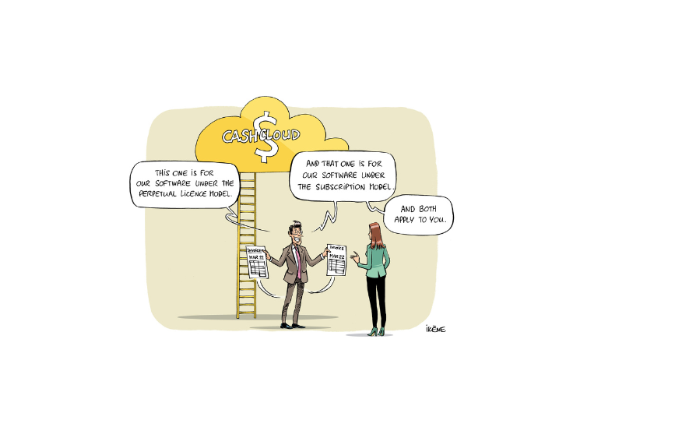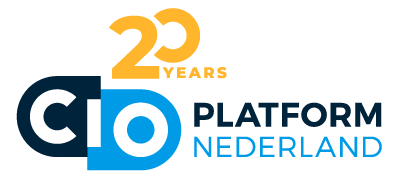Fair Principle 10: Commercial models and offerings shall be consistent and reasonable, not combining different models for the benefit of the vendor’s revenue
Fair Principle 10: Commercial models and offerings shall be consistent and reasonable, not combining different models for the benefit of the vendor’s revenue
 Tuesday 27 September 2022
Tuesday 27 September 2022 Business users associations Beltug, Voice, Cigref and CIO Platform Nederland call for a balanced cloud market: 11 fair principles to unleash Europe’s digital potential. Fair principle 9 calls for commercial models to not be changed unilaterally and be adhering to an active ‘opt-in’ principle.
Vendors of business software and customers should all start with the same end in mind; a clear, consistent and well-defined commercial model that’s a win-win for both parties. But practice is different.
Over the years, the way in which software is licensed has been evolving. There are licences per CPU, user, device, revenue, documents processed in a software, extra security features, ect. It has become complex to calculate the needed licenses within an organisation. On top of that, vendors change their models over the time the software is used, often with extra costs and limited if any benefits to the user organisations.
For instance:
- A change from a machine-based towards a user-based model. With the machine-based licence budgeting was easy, you count the number of machines and multiply this by the cost per licence. But in the situation where several people use the same machine, when the licencing model changes to a per user model, not only do the license costs change dramatically, the company also has to track and log who is using the machines and when. It is clear that the use case needs to be completely re-analysed if such a change is imposed. Furthermore, for the user organisation this change of model brings a lot of extra costs, but no benefit whatsoever.
- Perpetual licence model or subscription model, not both. In the past, business software was often licenced in perpetuity, for which of course came at a substantial cost. But when the vendor changes the commercial model to a subscription model, which happens very often and usually unilaterally, the expected cost of ownership changes substantially. And when this change happens during a commitment term, it makes cost calculation extremely difficult. The subscription model with the recurring subscription charges resembles the maintenance and support fee that came with the perpetual licence, but business users are not compensated for their earlier investment in the licence itself. Because of vendor lock in, the customer has limited alternatives if the product is only continued under a subscription model: either run the original software without maintenance and support, risk being left with no help if the software crashes or other software platforms connected with it are upgraded, or follow the vendor change to subscription model.
Business users are asking for a clear cost of ownership, possibility for cost forecasting etc. That is precisely why this tenth principle is important; commercial models and offerings shall be consistent and reasonable, not combining different models for the benefit of the vendor’s revenue.
More news
Kick off session CxOs in the Maritime Sector | Data in the Port Ecosystem
 Friday 19 July 2024 Knowledge sharing on digitization topics relevant to the maritime sector. Meetings are organized by/in cooperation with CIO Platform Netherlands and are open to organizations wishing to share knowledge on substantive issues. CIO Platform Netherlands reserves the right to deny access to meetings. full story
Friday 19 July 2024 Knowledge sharing on digitization topics relevant to the maritime sector. Meetings are organized by/in cooperation with CIO Platform Netherlands and are open to organizations wishing to share knowledge on substantive issues. CIO Platform Netherlands reserves the right to deny access to meetings. full storyA quick look back at the first six months of 2024
 Friday 12 July 2024 A nice summer blog of our new board member Edward Cox, also General Manager Louwman Group Services. Have a nice summer! full story
Friday 12 July 2024 A nice summer blog of our new board member Edward Cox, also General Manager Louwman Group Services. Have a nice summer! full storyAnnual Day 2024 - Aftermovie
 Monday 08 July 2024 A record number of CIO Platform Nederland members gathered on June 6th to celebrate our community's valuable and sociable Annual Day together under the banner 'Elevate your Digital Transformation'. Watch the aftermovie here. full story
Monday 08 July 2024 A record number of CIO Platform Nederland members gathered on June 6th to celebrate our community's valuable and sociable Annual Day together under the banner 'Elevate your Digital Transformation'. Watch the aftermovie here. full storyResearch on labour market shortages, help us reach 100 and help yourself!
 Monday 24 June 2024 The shortage of qualified ICT talent is a brake on growth for many organisations. Together with other organisations, we are committed to tackling this challenge. We would like to ask for the help of our members by filling out a survey. full story
Monday 24 June 2024 The shortage of qualified ICT talent is a brake on growth for many organisations. Together with other organisations, we are committed to tackling this challenge. We would like to ask for the help of our members by filling out a survey. full story